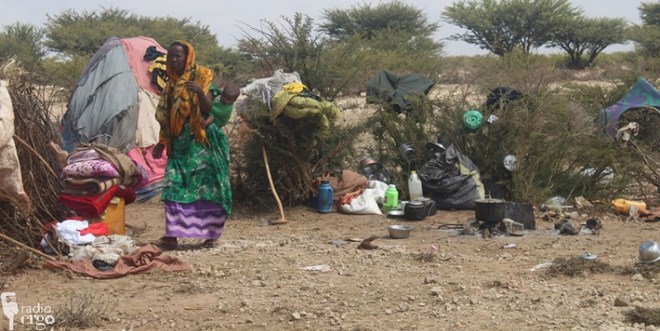
Monday November 1, 2021

Families in drought-hit villages in central Somalia struggle to make ends meet/File Photo/Ergo
(ERGO) – Hassan Ali Ahmed, a shopkeeper in the small central Somali village of El Hur, is struggling to keep his business going due to the chain of debt he is caught up in, caused by the deepening drought.
His customers in the village 70 kilometres from Harardhere in Mudug region are mostly pastoralists, who have been losing their livestock to the severe lack of water and pasture.
“You can’t tell a long-time customer that now your livestock don’t have market value, I can’t sell to you. The people in this village depend on livestock for a living, and now that there is no market for the livestock, the businesses have all been affected,” Hassan said.
In the seven years he has been running the shop, he said this is the worst hardship he has seen. He re-stocked his shop recently with goods he himself bought on credit from stores in the main city of Galkayo.
“I tell the store owners I will pay them once the pastoralists start selling their livestock and pay me the money they owe me. Debt has spread everywhere!” he said.
The drought has also affected restaurant owner, Mohamoud Adan Hashi, who sells tea and homemade bread at his small restaurant in the village. He has been running the restaurant for 12 years but is contemplating closing it as custom has reduced to a minimum. The few times he opened lately some customers turned up wanting to eat and pay later.
“The business depended on the pastoralist customers. The market is not the same now. I used to bake bread using 15 kgs of flour but now I only bake with five kgs and don’t manage to sell half of it. That is how hard life has become,” he said.
Mohamoud also has a herd of 20 goats and 10 cows and used to have enough milk for his family as well as to make sales of around five dollars a day. However, his sickly livestock are not producing any milk nowadays. He feeds the animals on old newspapers that his son collects from Galkayo town because he has no money to buy them livestock feed. He has to pay two dollars to have the newspapers transported by pickup truck.
Mohamoud’s two wives and 16 children are now depending on food he takes on credit from stores in Galkayo. He has already accumulated $800 in debt. He himself has given out $2,600 in credit to his customers since mid-2020 and is not expecting repayments anytime soon as he knows the dire situation facing pastoralists.
He can no longer provide milk for his children from his own herd.
“The milk for the children is sent from Galkayo by business associates. I tell them I will pay them, but the drought has affected our daily lives greatly, so there is no market. We pray to God to get us out of this situation,” he said.
Accessing water is becoming harder by the day in El Hur.
Dahabo Mohamoud, a mother of 12 who provides for her family by selling tea, said she is struggling to buy water. She has been working as a tea lady for 15 years and is making about five dollars a day, as most of her customers have stopped buying tea due to the hardships.
She told Radio Ergo she spends five dollars buying a 200-litre barrel of water every two days. A barrel used to cost two dollars before the drought set in, but scarcity has forced prices to go up. Water is transported on donkey carts from a well 18 kilometres from the village.
“I don’t know what other business I could start. Selling tea is the only job I know well. This is the time we are just accumulating debts,” she complained.